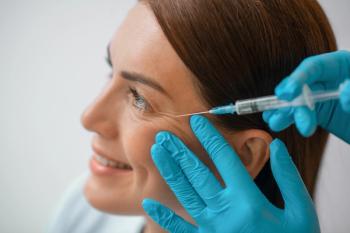
Building a cosmeceutical brand
Dermatologists who sell cosmeceutical products in their offices have options. Among the popular choices: They can sell already branded lines or brand their own skincare, hair, nail and other products.
Dermatologists who sell cosmeceutical products in their offices have options. Among the popular choices: They can sell already branded lines or brand their own skincare, hair, nail and other products.
While selling a popular cosmeceutical brand in the office can create a revenue stream for dermatology practices, it’s more likely that practices that have their names - and not another company’s name on those products - will reap other bottom line benefits, like client loyalty, repeat business and greater name recognition, according to Cheryl Whitman, CEO, of the aesthetic business consulting firm
“I feel every dermatologist should have their own brand. They could start out with a hero product - a single product or ingredient they love,” she says. “The margins are amazing on custom branded products and there are several ways to do this. The least expensive option, a white label product is when you put your own name on a product that already exists. Private branded, a slightly more expensive option, is the same but allows you to tweak some formulas. Then there is the more expensive option, taking your products to the next level, where you custom-formulate your own products.”
Having a branded cosmeceutical line can set a practice apart from the competition, Whitman says. Whereas patients might be able to get popular brand names online for less money, they can only buy the branded or customized products from the practices that brand them. And if people have to come back to get more products, it helps with client retention and patient loyalty.
Patients Perceive Benefit
Building a cosmeceutical brand fills a need for patients.
“All patients need to buy products. Why not buy it from the doctor, someone they look up to as the authority? If you think in terms of per patient, you’re going to sell between 6 and 12 of the same products per year,” she says. “You’re offering a service by helping patients save time and money by cutting through the clutter of retail shopping while supplying them with high-end efficacious products that you recommend.”
At the same time, dermatologists shouldn’t promote or create a skin care line just because they think they should. Rather, they should align with cosmeceutical ingredients and products they believe in and that are extensions of services they enjoy performing in practice, according to Whitman.
A Brand Is As a Brand Does
“You need to have a story. You need to have a mission statement. You need to back up your brand,” Whitman says. “Rather than just making another generic L-ascorbic vitamin C serum, we like to do research with our doctors on key ingredients. We look for new ingredients along with those that are tried and true. We’ll look at what’s going on overseas and in Europe. We also favor products that have testing behind them.”
Whitman says her company recommends testing products before putting them on doctors’ shelves. Before they put their names on products, doctors can test the creams and serums that they plan to sell by having staff, friends, VIP clients and others try them first.
For the typical high-end cosmeceutical, dermatologists branding those products should pay close attention to how they’re bottled and packaged.
“Obviously the aesthetics business is very aesthetic-oriented,” Whitman says. “So, if the bottle is really pretty, sleek or has a sexy high-end look to it, you can usually charge more money for it.”
Whitman says she recommends that practices start with selling their branded cosmeceuticals to patients, then go out into the community and beyond.
“You should have a shopping cart on your website. Designate somebody in your office to be in charge of shipping the product. We actually have concierge VIP doctors who deliver the products to people’s homes, where one of the staff members drop it off,” Whitman says.
The products should be displayed nicely in the office. Dermatologists can promote their brand by giving out samples at events, creating gift baskets for charities and more. In each case, it’s important to pay attention to how the product looks, she says.
Dermatologists can also bundle their branded products into services they offer. If they sell facial skin care products, they might bundle a month’s worth into facial laser, microdermabrasion or peel procedures as pre- and post-treatment care.
A branded cosmeceutical business that starts small can become big, according to Whitman. Some practices are so successful with their branded lines that they patent the formulas and sell them internationally, she says.
For more on the topic of aesthetic business branding:
On December 12, Whitman is spearheading the day-long “A Branding Facelift: Ensuring Success in Practice Enhancement at Every Angle” preconference workshop at the American Academy of Anti-Aging Medicine (A4M) 2018 World Congress in Las Vegas. Aesthetic Channel readers who use the code BF 2018 can save $100 off the $599 price for registration. For more information, contact Cheryl Whitman at cheryl@beautifulforever.com. To register,
Newsletter
Like what you’re reading? Subscribe to Dermatology Times for weekly updates on therapies, innovations, and real-world practice tips.











